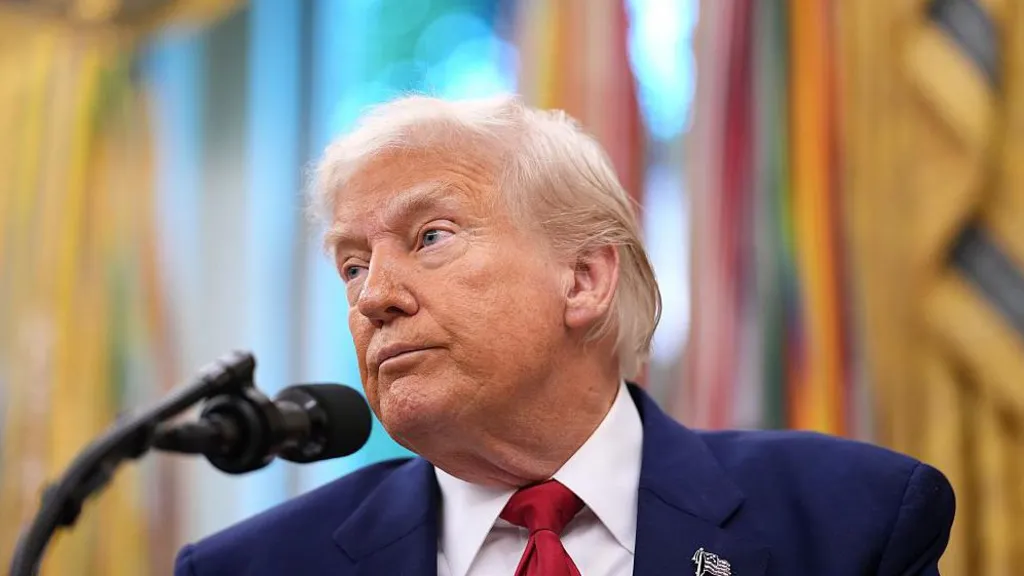In an explosive turn of events, U.S. President Donald Trump confirmed on Saturday that his relationship with tech mogul Elon Musk, once a close ally, has come to an end. The dramatic fallout between the two influential figures has captured widespread attention, particularly after a series of public exchanges on social media. Their previously cordial connection, which included Musk’s vocal support for Trump’s presidential campaign and his efforts to assist in shaping public policy, has now dissolved into bitter criticism, creating a rift that has left many political observers questioning the future of Musk’s involvement in the political sphere.
The announcement of the breakup was made during an interview with NBC News, where Trump was asked whether he thought the relationship with Musk was over. Trump’s response was short and definitive: “I would assume so, yeah,” he said, adding that he did not wish to mend the fractured relationship. When probed further on the matter, Trump replied bluntly, “No,” when asked if he hoped to repair the ties that once brought the two together. The interview marked the culmination of a series of escalating disputes between the two men, which had been unfolding for weeks in the public eye, mostly via social media.
The downfall of the once cordial relationship between Trump and Musk traces back to the tech billionaire’s vocal criticism of Trump’s domestic policy, particularly his tax and spending bill, known as the “Big Beautiful Bill,” which aimed to address various financial issues in the U.S. Musk, who had been an outspoken supporter of Trump during his election campaigns, turned his ire on the President’s key piece of domestic legislation. Musk’s decision to publicly criticize Trump’s tax bill was seen as a major betrayal by many within the political and corporate circles that had supported Musk. His comments came as a surprise to many, considering his past endorsement of Trump’s political platform and the large financial donations he had made to Trump’s campaign in 2016.
The turning point in their relationship came when Musk took to social media to voice his opposition to the bill, warning that it would add trillions of dollars to the national deficit and potentially undermine his efforts in reducing government spending. His remarks on social media and public statements appeared to strike a personal chord with Trump, who has long prided himself on his ability to push through legislation and assert his influence in the political sphere. Trump, in turn, was quick to express his disappointment in Musk’s actions, publicly stating that he felt betrayed by the billionaire’s criticism of the tax bill.
In response to Trump’s comments, Musk took to his own social media platform, X (formerly known as Twitter), where he unleashed a series of posts that took the conflict to new heights. Musk implied that Trump would not have won the 2016 election without his help, and even went as far as to accuse Trump of being implicated in the scandal surrounding Jeffrey Epstein, the disgraced financier who was arrested on sex trafficking charges and died in prison in 2019. The explosive accusations sent shockwaves across both the political and tech worlds. Musk’s post, which has since been deleted, sparked further controversy as the lawyer for Epstein’s estate immediately issued a denial of the claims.
Trump, known for his combative approach to dealing with adversaries, quickly responded to Musk’s social media tirade on his own platform, Truth Social. In a series of posts, Trump called Musk “crazy” and made threats to cut his business dealings with the federal government. The President’s comments appeared to fuel the public tension between the two men, turning the private rift into a full-blown public spectacle. The feud not only garnered attention from the media but also from political analysts, who began to speculate on the potential consequences of Musk’s growing criticism of the President, particularly in the lead-up to the 2024 election.
The most recent comments from Trump in his NBC News interview reflected the deepening divide between him and Musk. Trump accused the billionaire of being “disrespectful to the office of the president,” a remark that underscores the high stakes in their ongoing feud. For Trump, the presidency is a position of great prestige, and any perceived disrespect from a high-profile figure like Musk was bound to trigger a public reaction. “You could not disrespect the office of the president,” Trump added, reiterating his disdain for Musk’s actions. This statement further solidified the notion that the relationship between the two men had irreparably soured.
As the feud continues, many are wondering about the future of Musk’s political influence and his involvement in next year’s elections. Musk has previously hinted that he may support political candidates who oppose the lawmakers who backed Trump’s tax bill. The suggestion that Musk could throw his support behind challengers to Republican candidates has only added fuel to the fire. In his interview, Trump warned Musk of “serious consequences” if he were to back Democratic candidates running against Republicans. The comment serves as a direct warning to Musk, signaling that his political support may be a liability if he chooses to align himself with the opposition.
While the public feud between Trump and Musk may seem like a battle of egos and political ideologies, it also reveals the deep divide within American politics today. Musk, the world’s richest man and a powerful figure in the tech industry, has long been a polarizing figure in both the business world and the political landscape. His alliance with Trump, a man known for his unconventional approach to leadership, helped to solidify Musk’s position as a key influencer in political circles. However, Musk’s growing criticisms of Trump’s policies, especially regarding the tax and spending bill, highlight the complexities of their relationship and the challenges of navigating the intersection of business, politics, and personal beliefs.
The fallout between Trump and Musk also raises questions about the influence of tech moguls in modern politics. Musk, who has used his platform to shape public opinion and influence political discourse, is no stranger to controversy. His tweets and public statements have often made headlines, and his involvement in politics has only grown over the years. However, his recent criticism of Trump’s policies has led many to question whether Musk’s influence can extend beyond the tech industry and whether his political leanings will align with those of the broader Republican Party moving forward.
As the feud continues to unfold, both Trump and Musk are likely to face increasing scrutiny from their respective supporters and detractors. The clash between the President and the tech billionaire has turned into a spectacle that reveals the underlying tension in American politics, where ideological differences and personal rivalries are often played out on public platforms. The future of their relationship, as well as Musk’s political involvement, remains uncertain, but one thing is clear: the fallout from this bitter dispute will continue to shape political discourse for months to come.
In the meantime, the broader political landscape is left to reflect on the implications of this high-profile conflict. With the 2024 election on the horizon, the fallout between Trump and Musk may have lasting effects on the political strategies of both the Republican Party and the tech industry. As the rivalry intensifies, the public will be left to decide what role, if any, Musk will play in the future of American politics.




